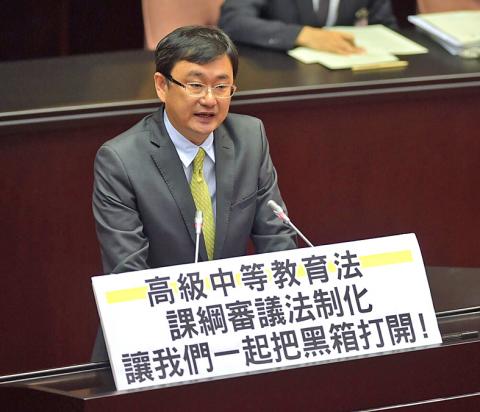The legislature yesterday passed amendments to the Senior High School Education Act (高級中等教育法) to overhaul the review process for the curriculum guidelines, which sparked protests against lack of transparency last year.
The amendments mandate that to improve accountability, the curriculum guidelines evaluation committee should be at the level of the Executive Yuan and its membership must include both governmental and nongovernmental representatives, including students’ representatives, who were not allowed a say previously.
Committee members affiliated with the government cannot exceed one-quarter of the total membership and nongovernmental committee members are to be selected through a process similar to that of the Taiwan Public Television Service Foundation’s board of directors.

Photo: Huang Yao-cheng, Taipei Times
The amended law authorizes education-related institutions, schools, legal personnel and groups to submit proposals for curriculum changes, in addition to permanently established governmental organizations dedicated to curriculum research and development.
Curriculum guideline research, development, evaluation and implementation must respect the guiding principles of ethnic pluralism, gender equality, transparency and political non-partisanship with regard to political parties, the amendment says.
In response to public criticism of the composition of curriculum guideline evaluation committees, the amended act is to limit government representatives in the curriculum guidelines committee to no more than one-quarter of its total of between 41 and 49 members.
Government representatives on the committee are to be nominated by the Ministry of Education from central and local government personnel and approved by the premier, the amendment says.
Nongovernmental committee members are to be nominated by the Executive Yuan and are to be accredited educational professionals, and are to include experts, academics, school principals, teachers and other education-related nongovernmental organizations, in addition to parents and students.
Nominations must be submitted to a panel appointed by the legislature for approval, the amendment says.
The panel will comprise of between 11 and 15 legislature-appointed objective and nongovernmental individuals, and is to approve the Executive Yuan’s nominee list (of the nongovernmental committee members) by a majority vote, it says.
A curriculum guideline evaluation committee member has a term of four years, with the possibility of serving consecutive terms, and each gender cannot have less representation than one-third of the committee.
Aborigines must be present in both the governmental and nongovernmental committee membership bodies, the amendment says.
To improve democracy on campus, the amendment also requires the presence of democratically elected student representatives or student association representatives on senior high school disciplinary committees.
Premier Simon Chang (張善政) responded to the amendment’s passage yesterday by saying that, while he understands that legislators want to emphasize the importance of the curriculum issue by elevating the evaluation committee to Executive Yuan level, he believes that “governmental responsibilities must be principally discharged by the relevant government agency.”
Chang said that he is concerned about the “available manpower” at the Executive Yuan and he would suggest that premier-designate Lin Chuan (林全) “reconsider” the passage of the amendment.

PREPAREDNESS: Given the difficulty of importing ammunition during wartime, the Ministry of National Defense said it would prioritize ‘coproduction’ partnerships A newly formed unit of the Marine Corps tasked with land-based security operations has recently replaced its aging, domestically produced rifles with more advanced, US-made M4A1 rifles, a source said yesterday. The unnamed source familiar with the matter said the First Security Battalion of the Marine Corps’ Air Defense and Base Guard Group has replaced its older T65K2 rifles, which have been in service since the late 1980s, with the newly received M4A1s. The source did not say exactly when the upgrade took place or how many M4A1s were issued to the battalion. The confirmation came after Chinese-language media reported

The Taiwanese passport ranked 33rd in a global listing of passports by convenience this month, rising three places from last month’s ranking, but matching its position in January last year. The Henley Passport Index, an international ranking of passports by the number of designations its holder can travel to without a visa, showed that the Taiwan passport enables holders to travel to 139 countries and territories without a visa. Singapore’s passport was ranked the most powerful with visa-free access to 192 destinations out of 227, according to the index published on Tuesday by UK-based migration investment consultancy firm Henley and Partners. Japan’s and

A Ministry of Foreign Affairs official yesterday said that a delegation that visited China for an APEC meeting did not receive any kind of treatment that downgraded Taiwan’s sovereignty. Department of International Organizations Director-General Jonathan Sun (孫儉元) said that he and a group of ministry officials visited Shenzhen, China, to attend the APEC Informal Senior Officials’ Meeting last month. The trip went “smoothly and safely” for all Taiwanese delegates, as the Chinese side arranged the trip in accordance with long-standing practices, Sun said at the ministry’s weekly briefing. The Taiwanese group did not encounter any political suppression, he said. Sun made the remarks when

BROAD AGREEMENT: The two are nearing a trade deal to reduce Taiwan’s tariff to 15% and a commitment for TSMC to build five more fabs, a ‘New York Times’ report said Taiwan and the US have reached a broad consensus on a trade deal, the Executive Yuan’s Office of Trade Negotiations said yesterday, after a report said that Washington is set to reduce Taiwan’s tariff rate to 15 percent. The New York Times on Monday reported that the two nations are nearing a trade deal to reduce Taiwan’s tariff rate to 15 percent and commit Taiwan Semiconductor Manufacturing Co (TSMC, 台積電) to building at least five more facilities in the US. “The agreement, which has been under negotiation for months, is being legally scrubbed and could be announced this month,” the paper said,